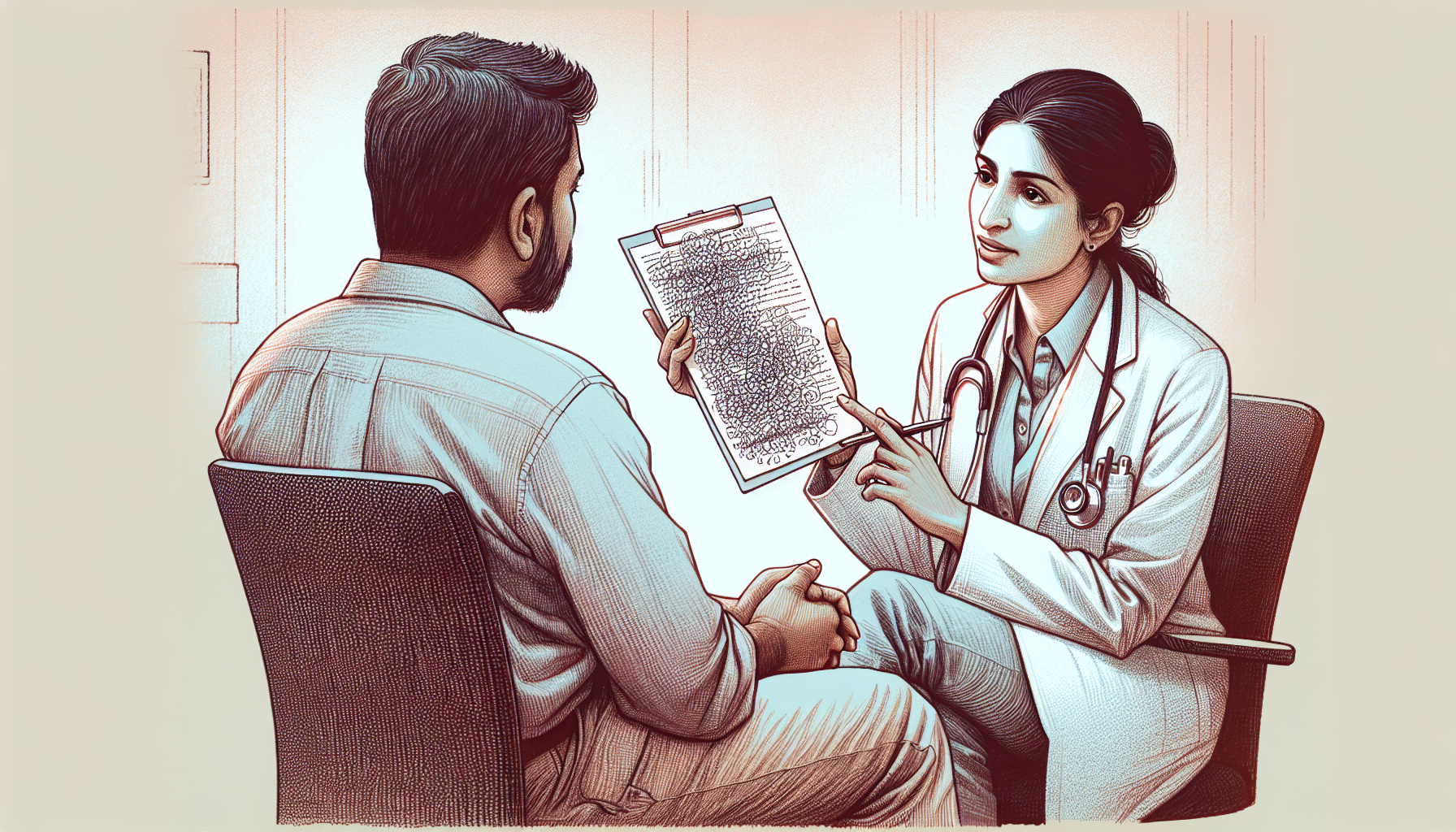
For many long-term disability claimants, getting their doctors to fill out disability paperwork can be a challenge. The health care world is beset by insurance forms and insurance companies. This article will help you help your doctors focus on just what the disability insurance company needs to help you navigate your disability claim. We will outline the process, what to expect, and the importance of their role, so you are equipped with knowledge and confidence to move forward with your claim.
Key Takeaways
- Without a doctor willing to tell the insurance company that you are disabled and explain why you cannot work; your claim has no chance. It’s really as simple as that.
A supportive doctor with a deep understanding of your medical history and the work you do is critical to the success of your disability claim, and consistent medical documentation and persuasive physician narratives are important.
Cultivating a strong patient-doctor relationship and effectively communicating your restrictions and limitations (i.e. how your condition prevents you from working) are key to ensuring your doctor provides the necessary support and documentation for your disability claim.
If your doctor is unwilling to help with your disability paperwork, seeking a second opinion or enlisting the assistance of a long-term disability attorney before you file your claim can significantly improve your chances of successfully navigating the disability claims process.
The Importance of Doctor Support in Disability Claims

The role of a supportive doctor is vital in the disability claims process. A cooperative doctor, armed with a comprehensive understanding of your condition and treatment history, can significantly impact the success of your disability claim. Understanding how a long term disability claims adjuster evaluates claims will help you and your doctor avoid simple mistakes in paperwork that could result in a denial of your disability claim.
Most importantly, the alignment between medical records and a doctor’s evaluation plays a pivotal role in the claim’s success. Don’t let your doctor shortcut the process by preparing forms that simply say please pay Mary’s claim, she is disabled. This will almost never work! Medical opinions consistent with the evidence carry the most weight, and your doctor’s opinion must be aligned with the medical records in order to bolster the chance of your claim being approved.
We will further examine two key aspects of doctor support: medical documentation and physician recommendations.
Medical Documentation
Think of medical documentation as the cornerstone of your disability claim. It’s the tangible proof that substantiates your claim, providing the disability insurance companies such as Unum, Reliance Standard, Mutual of Omaha, Cigna and New York Life with a clear insight into your health condition. But it isn’t just about the diagnosis; it’s also about:
the symptoms
their severity
treatment progress over time
assessments of any limitations relevant to your functional capacity and ability to do your job
As a disability claimant and patient, you should actively gather all relevant test results, treatment records, and long-term disability forms. Keeping your healthcare providers informed about any specialized tests or assessments done by other specialists ensures that a comprehensive medical file accompanies your disability claim. Understanding the importance of medical documentation, we now shift our focus to the role of physician recommendations in your claim.
Physician Recommendations
Physician recommendations are like a seal of approval on your disability claim. They provide the long-term disability claims examiner with an insight into your work-related limitations and medical condition, thereby playing an indispensable role in the claim process. Detailed recommendations that highlight the functional limitations and reasons preventing you from working can have a significant impact on your disability claim.
However, it’s important that such recommendations are persuasive, avoiding vague or superficial endorsements of your self-reported symptoms. The physician’s opinion, especially when provided by a specialist familiar with your specific condition, can be the deciding factor in the outcome of your disability claim.
Finding a Cooperative Doctor: Tips and Strategies
Finding a cooperative doctor who’s willing to fill out the necessary paperwork can feel like a treasure hunt. However, it’s a crucial step in the journey towards a successful disability claim. Beyond just filling out paperwork, you need a doctor who’s willing to engage in necessary communications with the insurance company or plan administrator.
But how do you find such a specialist? The answer lies in targeted research and building a strong patient-doctor relationship.
Researching Specialists
Finding the right specialist is like finding the right key to unlock the door to a successful disability claim. A specialist’s credibility and expertise in handling disability claims can add significant weight to your case. For instance, if you’re claiming disability due to rheumatoid arthritis, a rheumatologist’s support will add credibility to your claim when evaluated by the long-term disability insurance company.
Building a Strong Patient-Doctor Relationship
A strong patient-doctor relationship is like a sturdy bridge between your disability claim and success. It begins with clear communication, mutual respect, and consistency in care. If your current doctor is supportive and familiar with your medical history, it is always beneficial to start the process with them and will help bulletproof your claim against the insurance company’s independent evaluation doctors. A long-term relationship with your doctor provides consistent supportive documentation and aid, which is crucial for further paperwork needed for appeals.
Being an exemplary patient who treats healthcare providers with respect and courtesy can elicit their willingness to assist with disability paperwork. Transparency about medical issues and symptoms ensures your doctor can provide accurate documentation, thereby positively impacting your disability claim.
Communicating Your Needs to Your Doctor

Successful communication with your doctor is like navigating a two-way street. It involves setting expectations, providing necessary information, and ensuring both parties are aligned. Being forthright with your doctor by providing comprehensive medical evidence and timelines can help expedite the claims process.
Providing your doctor with a comprehensive overview of your disability, communication needs, and preferences ensures misunderstandings are minimized. Initiating the conversation by seeking the doctor’s opinion on your ability to work full-time can often be more effective than simply asking the doctor to corroborate the disability outright. Engaging directly with your doctor is especially crucial for patients with intellectual disabilities.
Setting Expectations
Setting clear expectations with your doctor is like laying the foundation for a successful claim. It’s crucial to be open about your disability, its limitations, and symptoms. Explaining the disability paperwork process and the role of specific forms ensures they are completed and submitted promptly for a successful claim.
A detailed recommendation letter from a doctor can play a persuasive role in your Social Security disability benefits application, highlighting the importance of conveying this to your physician.
Providing Necessary Information
Providing your doctor with necessary information is like equipping them with the right tools to help build your disability claim. This includes supplying deadlines and specific forms required for your claim. Providing your doctor with a comprehensive list of Social Security forms to be filled, along with instructions and reasons for each, facilitates the efficient completion of disability paperwork.
Detailed information about your impairment, its severity, duration, and the effect on your work-related activities, is crucial for your doctor to accurately and promptly complete the paperwork. Some doctors may not fill out forms but could be willing to write a letter in their own words if informed about this alternative. And if the doctor’s refusal is due to time concerns, offering to assist with drafting responses or information for the doctor to review and sign can be a helpful approach.
Overcoming Challenges: What to Do When Your Doctor Refuses to Fill Out Paperwork
To put it bluntly, you need a different doctor. Your claim will not be approved without physician support. It’s that simple.
Today doctors are overwhelmed, we get that. Often times they have multiple people on staff just to deal with the paperwork the insurance companies insist they need (but will not pay for!). So, how can you make sure your paperwork gets the attention it needs? First off, being a great patient who follows directions, who is pleasant and who understands that this is “above and beyond” work you are asking for can help move the needle towards getting your doctor to cooperate.
It’s important to remember that while a doctor’s support is crucial for a successful claim, they are not legally required to fill out disability forms. If your doctor refuses to fill out disability paperwork, we urge you to consult with our highly experienced long-term disability attorneys that will guide you for next steps.
Seeking a Second Opinion
When one door closes, another one opens. If your current doctor refuses to complete your disability claim forms, finding a different doctor who will support your claim is essential. Your current physician might direct you to another doctor who is familiar with and willing to help with the disability paperwork process. However, while seeking a second opinion is necessary, excessive doctor switching might be perceived as ‘doctor shopping’ for a favorable disability opinion.
Utilizing Legal Assistance
When navigating the complex disability claim process, legal assistance can be your north star. Consulting an experienced disability insurance lawyer can be beneficial when dealing with a disability insurance company, especially in situations such as:
a doctor is unwilling to support your claim
you need help addressing doctors’ concerns and misconceptions
you need assistance in completing and signing the disability paperwork
These attorneys can provide the guidance and support you need to navigate the disability claim process successfully.
If your claim is denied due to the the insurance company not fully considering your doctor’s opinion, disability lawyers can assist with the appeal process and ensure the provision of appropriate documentation.
Working with a Disability Attorney: Maximizing Your Chances of Success
Working with a disability attorney offers several benefits, including:
Having a seasoned guide on your journey towards a successful disability claim
Improving your chances of successfully appealing your provider’s decision
Leveling the playing field between you and the insurance company, while securing your disability insurance benefits
Disability attorneys like those on our team, are skilled in understanding complex laws, including ERISA disability regulations, and use extensive knowledge of insurers’ tactics to fight back against wrongfully denied claims. They also leverage an extensive evidence database, tailoring each case to the client’s unique needs. This approach is critical when dealing with long-term disability appeals and litigation, especially when facing billion dollar insurance companies and other insurance companies.
Expert Knowledge
When you have a disability attorney in your corner, you’re equipped with expert knowledge that can significantly enhance your disability claim. Disability attorneys specialize in the definitions of disability in insurance plans, including disability insurance coverage, which can vary and carry policy-specific limitations. They’re also skilled in disability law, providing invaluable expertise during hearings.
Disability lawyers also engage in:
strategic litigation
advocacy to drive systemic change
working with disability rights organizations
advocating for inclusive policies and legislation
Balancing individual client interests with broader objectives of the disability rights movement, they often seek cases that provide community-wide benefits.
Advocacy and Support
Disability attorneys don’t just bring their expert knowledge to the table; they’re also staunch advocates for their clients’ rights. They ensure that patients with disabilities and who cannot work are properly represented during the claims process, providing comprehensive support by coordinating medical reviews and gathering evidence.
When doctors are uncooperative or reluctant to fill out necessary disability paperwork, disability attorneys can intervene to secure the documentation needed for a successful claim. If necessary, they can take legal action against doctors who are not fulfilling their responsibilities to patients with disabilities.
Summary
Navigating the process of a disability claim can be challenging, but with a supportive doctor, a strong patient-doctor relationship, effective communication, and the right legal assistance, the path to success becomes significantly smoother. Remember, your disability claim is not just about the forms; it’s about your livelihood, your health, and your future. So, arm yourself with the right knowledge, find the right allies, and embark on this journey with determination and resilience.
Frequently Asked Questions
If I Have More Than One Doctor, Who Supports My Claim?
Make sure they all get heard by the insurance company. Just be careful that the specialist for your condition is the loudest voice…meaning, if your disability is caused by a neurological condition, make sure your neurologist comments in support of your claim. It won’t matter what your primary care doctor, rheumatologist, etc. have to say if the primary doctor treating your disability doesn’t stand up for you.
How do I ask my doctor to write a letter for disability?
When you speak to your doctor, be honest and provide specific examples of how your medical condition impacts your ability to work and perform daily tasks. Explain how these challenges make it difficult for you to maintain employment and ask if they would be willing to write a letter in support of your disability application.
What form does my doctor have to fill out for disability?
Your doctor will typically need to fill out an attending physician form. (Here is an example of an attending physician form.) You should use your insurance company’s form.
What should I say to a your doctor who is filling out my forms?
To support your disability claim, never downplay your condition, exaggerate your symptoms, or give your opinion at the doctor’s assessment. Avoid saying you’re okay or not in pain during the assessment. Remember, honesty is key!
Does my doctor have to fill out disability paperwork?
No, your doctor is not required by law to fill out disability paperwork, but their support and documentation are essential for a successful disability claim.
My short or long-term disability claim was denied, what do I do next?
Utilize our Free Denial Letter Review. Our highly experienced team will review your insurance denial letter for free and supply you with a personalized strategy for next steps.
BenGlassLaw fights for wrongfully denied workers across the nation.
Since 1995, BenGlassLaw has been helping sick, injured, and disabled workers fight unfair claim denials, get the benefits they paid for, and get their lives back on track. We are passionate about restoring our client’s denied benefits because insurance policies should be part of the solution, not a cause of additional stress. What makes our team unique?
- Our Experience. We file more disability appeals and lawsuits than any other firm in the Mid-Atlantic. (Source: Pacer, the official government site for Federal Court lawsuits)
- Our Leadership. Our work in ERISA Law is recognized and respected across the nation. We speak at national events and teach other national disability attorneys about our own techniques and processes for handling ERISA and life insurance denials.
- Ongoing Support. Once we get our clients back on claim, it’s never them vs the insurance company again. For as long as our client receive benefits, we handle the insurance company — which is why we manage over $33 million in future disability benefits on behalf of our clients.
